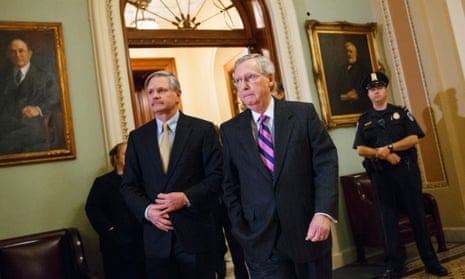The most significant attempt yet to force US government approval of the Keystone XL oil pipeline failed narrowly to clear the Senate on Tuesday night as a coalition of Republicans and moderate Democrats fell one vote short of the 60 votes needed for the legislation to pass.
Fourteen Democrats, led by Louisiana senator Mary Landrieu, joined all 45 Republicans in voting for the bill, which called for the controversial energy project to be given immediate go-ahead after years of delay due to environmental concerns.
A similar bill was passed in the House of Representatives on Friday.
But, as expected, the bipartisan coalition failed to win over sufficient wavering Democrats, such as Jay Rockefeller of West Virginia and independent Maine senator Angus King, who joined the party’s leadership and opposed the bill for a total of 41 votes against.
Landrieu, who is fighting to hold on to her seat in a run-off election next month, had called for the bill in a last-ditch effort to shore up her support in Louisiana. She attempted to heal party rifts afterwards, telling reporters in the Senate: “there is no blame, there is only joy in the fight”.
Nevertheless the size of the Democratic rebellion may put additional pressure on the White House to approve construction of the pipeline in future if, as promised, Republicans make a fresh attempt to pass legislation when the new Senate is sworn in next January.
Barack Obama has insisted so far that a State Department environmental review of the pipeline, which would run from Canada’s booming oil sands to refineries in Texas, should be completed before a final decision is made.
Critics in Congress argue this review process, which has been ongoing for six years in total, is an attempt to park the controversial issue by the White House, which declined earlier on Tuesday to spell out precisely whether Obama would have exercised his veto had the bill passed.
However, environmentalists argue that approving Keystone would commit the US to fully exploiting North American oil deposits that may add considerably to carbon dioxide emissions and climate change.

During six hours of debate leading up to the vote, Landrieu insisted she was not oblivious to climate change risks but argued the largely Canadian tar sands would be exploited regardless of whether pipelines brought the oil to US refineries or not.
“I am not a denier of climate change,” she said. “This is America’s hour to become energy independent. We don’t have to kow-tow to Russia ... and we can build a new energy renaissance”.
Even her opponents in the Senate paid tribute to her tenacity in pushing the legislation, which is also backed by her Republican challenger in the run-off, congressman Bill Cassidy.
“I just want everyone who might be watching from Louisiana to know that without Mary Landrieu we would not be having this debate,” said California Democrat Barbara Boxer.
“We Democrats are a big umbrella. We have senators that agree with big oil philosophy ... and we have senators who are pushing clean energy.”
The 14 Democrats voting in favour include three who are leaving the Senate in January after they lost their seats in the 4 November midterm elections: Kay Hagan of North Carolina, Mark Begich of Alaska and Mark Pryor of Arkansas. John Walsh of Montana, who is also leaving the Senate after he dropped his campaign due to scandal this summer, also voted in favour.
They were joined by Landrieu and nine others, many in close-fought states: Joe Manchin of West Virginia, Michael Bennet of Colorado, Heidi Heitkamp of North Dakota, Bob Casey of Pennsylvania, Tom Carper of Delaware, Jon Tester of Montana, Joe Donnelly of Indiana, Claire McCaskill of Missouri and Mark Warner of Virginia.
Mitch McConnell, the Kentucky Republican who will become Senate majority leader in January, insisted there would be a fresh attempt to pass the legislation then.
“I look forward to the new Republican majority taking up and passing the Keystone jobs bill early in the new year,” he said.




Comments (…)
Sign in or create your Guardian account to join the discussion